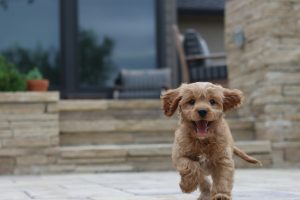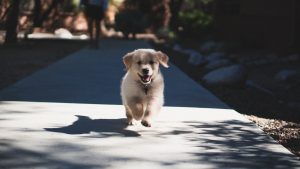Pawsitively Perfect: Mastering Potty Training for Your Puppy
This article provides tips on the importance of establishing a potty training routine for puppies, utilizing positive reinforcement techniques, managing and addressing accidents, and upholding patience and consistency throughout the training process.
Importance of Establishing a Potty Training Routine
Establishing a potty training routine is crucial for a puppy’s overall well-being and development. It goes beyond just maintaining a clean living environment; it is also a fundamental aspect of the puppy’s learning process. Consistent potty training routines help puppies understand when and where to relieve themselves, which in turn reduces accidents and promotes a sense of security and comfort in their environment.
For example, by implementing a consistent potty training routine, a puppy can learn to associate specific times and places for pottying. This routine aids in reducing confusion and anxiety, as the puppy knows what to expect and where to go when nature calls. Moreover, establishing a routine early on can contribute to the puppy’s overall discipline and well-being, setting the stage for a harmonious coexistence between the puppy and its human family members.
In essence, potty training routines are not only about cleanliness but also about fostering a sense of security, predictability, and well-being in a puppy’s daily life. It is a foundational step in their development, laying the groundwork for a happy and healthy life alongside their human companions.
Utilizing Positive Reinforcement Techniques
When it comes to potty training a puppy, positive reinforcement techniques are invaluable for fostering the desired behavior. For instance, when the puppy successfully relieves itself in the designated area, offering verbal praise in an enthusiastic tone can convey to the puppy that it has done something commendable. Additionally, providing small, tasty treats as a reward immediately after the puppy potties in the right spot can further reinforce this positive behavior.
Punishment should be avoided at all costs, as it can lead to fear, anxiety, and confusion in the puppy. Instead, focusing on rewarding the puppy for displaying the right behavior helps create a positive association with the potty training process. By consistently praising and rewarding the puppy for pottying in the designated area, the puppy will begin to understand the expected behavior and the associated rewards, leading to increased success in the potty training routine.
In addition to verbal praise and treats, potty training sprays can also be utilized as a positive reinforcement tool. These sprays are specifically designed to attract puppies to the designated potty area, making it easier for them to understand where they should relieve themselves. By using these sprays consistently in the designated spot and then rewarding the puppy for using it, the puppy will form a strong association between the location, the act of relieving itself, and the positive reinforcement it receives, thus strengthening the potty training routine.
 Managing and Addressing Accidents
Managing and Addressing Accidents
When it comes to potty training puppies, accidents are an inevitable part of the process, and it’s essential for owners to know how to effectively manage and address them. One common reason for accidents is excitement, where puppies may lose control of their bladders when they become overly excited. For instance, when a puppy is greeting their owner after a long absence, they might become so excited that they have an accident. In such cases, it’s important for owners to avoid bending over or petting the puppy excessively when they come home, as this can inadvertently lead to unconscious peeing incidents.
Another reason for accidents could be separation-related behavior, where puppies experience anxiety or distress when left alone, leading to indoor accidents. To address this, it’s crucial for owners to understand the signs of separation anxiety in puppies and work on creating a secure and comforting environment for their furry companions. This may involve gradually acclimating the puppy to periods of alone time and providing them with safe, engaging toys to alleviate any distress during separations. By recognizing these reasons for accidents, puppy owners can implement effective management strategies to support their pets through the potty training process, creating a positive and nurturing environment for learning [1].
Upholding Patience and Consistency
When it comes to potty training a puppy, patience and consistency are absolutely crucial. It’s important to remember that puppies, like human babies, are learning a new skill, and this takes time and understanding. By consistently following a potty training schedule and being patient with the process, puppy owners can provide the necessary support for their furry companions to succeed in learning this essential skill.
For example, if a puppy has an accident indoors, it’s important for the owner to remain calm and not react with frustration. Instead, gently redirecting the puppy to the designated potty area and using positive reinforcement when they go in the right spot can help them understand where they should be relieving themselves. This consistent approach, combined with patience, helps the puppy make the connection between the designated potty area and the act of elimination, reinforcing the desired behavior.
Additionally, understanding the puppy’s individual needs and signals is a key part of maintaining consistency in the potty training routine. Every puppy is different, and they may have their own unique cues that indicate when they need to go potty. By paying close attention to these signals and consistently providing opportunities for the puppy to relieve themselves, owners can help their puppies understand the appropriate times and places for pottying, leading to a successful training outcome.
 Conclusion and Encouragement
Conclusion and Encouragement
In conclusion, establishing a successful potty training routine for a puppy is a vital aspect of responsible pet ownership. By emphasizing routine, positive reinforcement, accident management, patience, and consistency, puppy owners can effectively guide their puppies through the potty training process, contributing to their overall well-being and development. It is important for puppy owners to remain patient and consistent, as successful potty training is achievable with the right approach and dedication.
Potty training is more than just teaching a puppy where to relieve themselves; it’s about fostering a strong bond and understanding between the owner and their pet. For example, using positive reinforcement techniques such as verbal praise and treats not only encourages proper potty behavior but also strengthens the relationship between the puppy and its owner. When a puppy is consistently praised and rewarded for pottying in the designated area, it builds trust and reinforces the desired behavior.
Furthermore, accidents are an inevitable part of the potty training process, and it’s important for puppy owners to approach them with understanding and patience. For instance, by calmly addressing accidents and avoiding punishment, owners can help prevent anxiety or fear in the puppy, fostering a positive and nurturing environment for learning. Additionally, through consistent training and management, puppies can quickly adapt to the routine and develop good potty habits, ultimately leading to a clean and harmonious living space for both the puppy and its owner.

